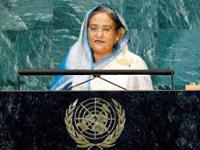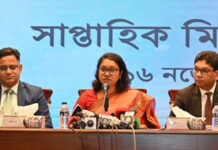Expressing Bangladesh’s firm commitment to low-carbon, climate-resilient development path, Prime Minister Sheikh Hasina on Tuesday said the large carbon emitting countries should make robust voluntary commitments to match countries like Bangladesh.
She also said that Bangladesh would never exceed the average per capita emission of the developing world.
“As I said in New York (in 2012), let me re-assure, as a responsible member of the international community, Bangladesh will never exceed the average per capita emission of the developing world.
“It is our firm commitment to (follow) low-carbon, climate-resilient development path. The large emitting countries should reciprocate, by robust voluntary commitments, (gestures) from countries like ours,” Hasina said, addressing the UN Climate Summit Round-Table here in the morning.
UN Secretary-General Ban Ki-moon, Mayor of the City of New York Bill de Blasio, Chair of the Intergovernmental Panel on Climate Change Rajendra Pachauri, Chairman of Generation Investment Management and the Climate Reality Project and former US Vice President Al Gore, actress and UN Environment Programme Goodwill Ambassador Li Bingbing, actor and UN Messenger of Peace Leonardo DiCaprio and Civil Society Representative from the Marshall Islands Kathy Jetnil-Kijiner also spoke at the round table.
Sheikh Hasina said that in recent years, Bangladesh has undertaken significant steps as the country now have 3.2 million Solar Home Systems and over 1.5 million Improved Cook Stoves across Bangladesh.
“We have developed stress-tolerant crop varieties; and implemented Bangladesh Climate Change Strategy and Action Plan. Though we are a climate-vulnerable LDC, we allocated 385 million US dollars from our own resources, for adaptation and mitigation,” she said adding that many ecosystem-based, community-based adaptation measures have also been put in place.
The Prime Minister said that yet, climate change continues to affect the lives and livelihoods of millions in unique and active delta as frequency and intensity of flooding, storm surge and salinity intrusion are badly affecting the country’s coastal habitat.
“Climate change may threaten our wheat and major rice crop (Boro) production. In addition, many people may have to move out, changing their traditional living and livelihoods. Studies suggest that 2 to 3 percent of our GDP may be wiped out because of climate change.
“If we are not ambitious about climate ‘mitigation’, adaptation costs will be much higher than is estimated today,” she added.
Highlighting some of the few specific points, the Prime Minister said all must stress that ‘adaptation’ and ‘loss and damage’ are crucial for sustainable development.
“Critical balance between adaptation and mitigation will have to be maintained. Also, in regard to support for finance, technology development and transfer, capacity building, and transparency of action and support.”
She said that the respective ‘Intended Nationally Determined Contributions (INDCs)’ must be clear, measurable and verifiable. “The world should also pay attention to ‘Carbon budgeting’ and ‘de-carbonization pathways’. Bangladesh is working on her possible INDCs.
But, new and additional resources will be needed for their implementation.”
Hasina said: “For us, private ‘climate finance’ can only be complementary, for mitigation. For adaptation planning and its implementation, adequate and predictable financing is essential.
There should be greater ‘fast-track finance’ for adaptation, particularly for the climate-vulnerable countries.
“Green Climate Fund (GCF) would need to take those into account, particularly for the climate-vulnerable countries like Bangladesh. Robust and early capitalization of GCF is crucial for us,” she added.
Terming ‘adaptation’ as the key, the Prime Minister said: “We cannot be left to adapt to ‘degradation’ because of climate change. The developed countries must come forward to match robust commitments and efforts from countries like ours,”
She said support to wider ‘capacity building’ is equally important. Same is true for ‘technology’. For LDCs, IPR must be facilitated. “What Bangladesh asks for is access to ‘life-saving technologies’ and support to developing ‘adaptive technologies.”
Earlier, addressing the opening ceremony of the much anticipated Climate Summit in the General Assembly Hall, UN Secretary General Ban Ki-moon told the world leaders, “We are not here to talk, we are here to make history” at an “unprecedented and important gathering” that aims to raise ambition, mobilize resources, and generate action towards a universal climate deal.
Those climate talks are being overseen by the UN Framework Convention on Climate Change (UNFCCC), which is the parent treaty of the 1997 Kyoto Protocol.
Source: Prothom Alo










